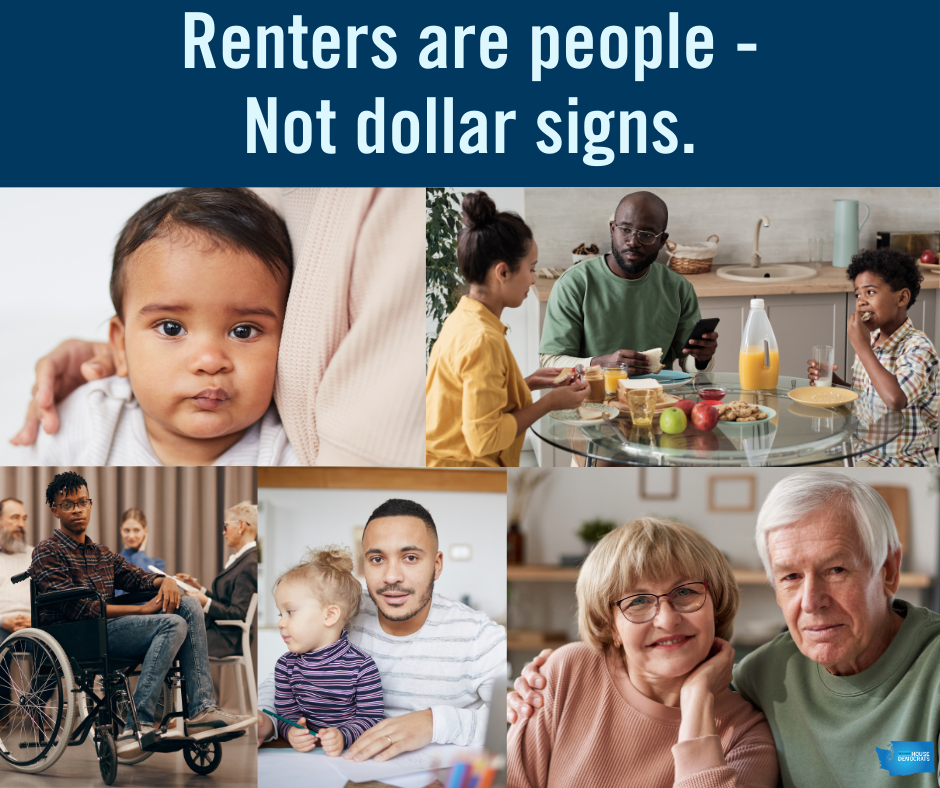Friends and neighbors,
For the last few sessions, I have spoken extensively on how the housing crisis is affecting all parts of Washington. Residents in every corner of our state face the housing shortage, sky-rocketing rents, and unstable living conditions. There isn’t one single solution to these problems. It is critical that we tackle this issue in three ways:
Supply
One of the major factors we need to tackle to turn the tide on the housing crisis is supply. Last year we passed legislation to remove barriers to building sensible and familiar housing options like accessory dwelling units, duplexes, triplexes, and row houses. This year we are continuing to work on this by looking at legislation to allow lot splitting with limits (House Bill 1245). We are also debating allowing more expanded housing options with bills on workforce housing (House Bill 1892), co-living housing (House Bill 1998), and supporting our manufactured housing communities (House Bill 2421). We are also looking at making it easier to develop unused commercial space into residential units (House Bill 2308).
Stabilize

Last year, the legislature took significant steps to increase housing supply and we are continuing that effort this year, but this step alone won’t help with rent affordability. It will take years for us to start to see benefits from these efforts. Renters need help now.
The scope of the problem is staggering. As of 2019, nearly half of Washington renters spent 30% or more of their income on housing, and over 20% spent half or more of their income on housing. The problem has only gotten worse since then. Residential and manufactured home tenants alike are facing the brunt of this crisis. Unpredictable and escalating rent increases create impossible choices. In fact, for every $100 that rent increases, homelessness rates increase by 9%. This disproportionately harms families with low incomes, people with fixed incomes and seniors, and communities of color.
We’re working to pass rent stabilization this year through House Bill 2114. Residential and manufactured home renters alike deserve the predictability and stability that homeowners with a mortgage experience. Washington residents with low or fixed incomes, those pursuing a degree or in career training, or those facing other life challenges won’t be able to budget their way out of homelessness. When the rental market is escalating at this pace, rent stabilization is a lifeline for Washington tenants.
Rent stabilization highlights:
- Caps rent increases at 5% a year for existing tenants.
- Renters will have 12 months of predictable rents, with an increase only happening annually with 180-day notice.
- If rate increases exceed 3%, tenants can terminate the agreement.
- The combined cost of move-in fees and security deposits cannot exceed one month’s rent.
- Fees, rent, and terms and conditions for month-to-month rentals cannot be more burdensome than longer-term rentals or vice versa.
- Commerce will create an online resource center for landlords, providing information on existing tenant law, links to local laws, grant programs and funds available, and model language around required lease provisions related to rent increases.
Support
Even if we address housing supply and stability, some of our neighbors still won’t be able to afford rent. Last year we increased our investment in deeply affordable housing through a historic $400 million Housing Trust Fund investment. This year we are examining other avenues to create more options for ongoing, stable, and predictable funding sources for housing support. Every single Washingtonian deserves a roof over their head. Everyone deserves the dignity of a safe place to call home.
For example, I’m supporting The Affordable Homes Act (House Bill 2276) which increases the supply of affordable housing for veterans, seniors, farmworkers, and people with disabilities by providing a more stable and predictable funding source. It modifies taxes on the sale or transfer of real property, reducing the real estate excise tax rate on most properties and adding a transfer tax on high-value properties sold for over $3,025,000. This reduces the share of taxes paid by low- and middle-income families and has the wealthiest Washingtonians share more equitably in funding this essential need in our communities.
As chair of the Housing Committee in the Washington House of Representatives, I am working with my colleagues to address all these issues. Stay tuned for more information as we continue to consider ways to address our housing crisis. You can also take a look at bills in committee by going to leg.wa.gov/bi/billsinandoutofcommittee and selecting the Housing Committee.
If you have any questions, comments, ideas, or concerns, don’t hesitate to reach out to my office. You can find my contact info at the bottom of this email.
Thank you,

Rep. Strom Peterson
